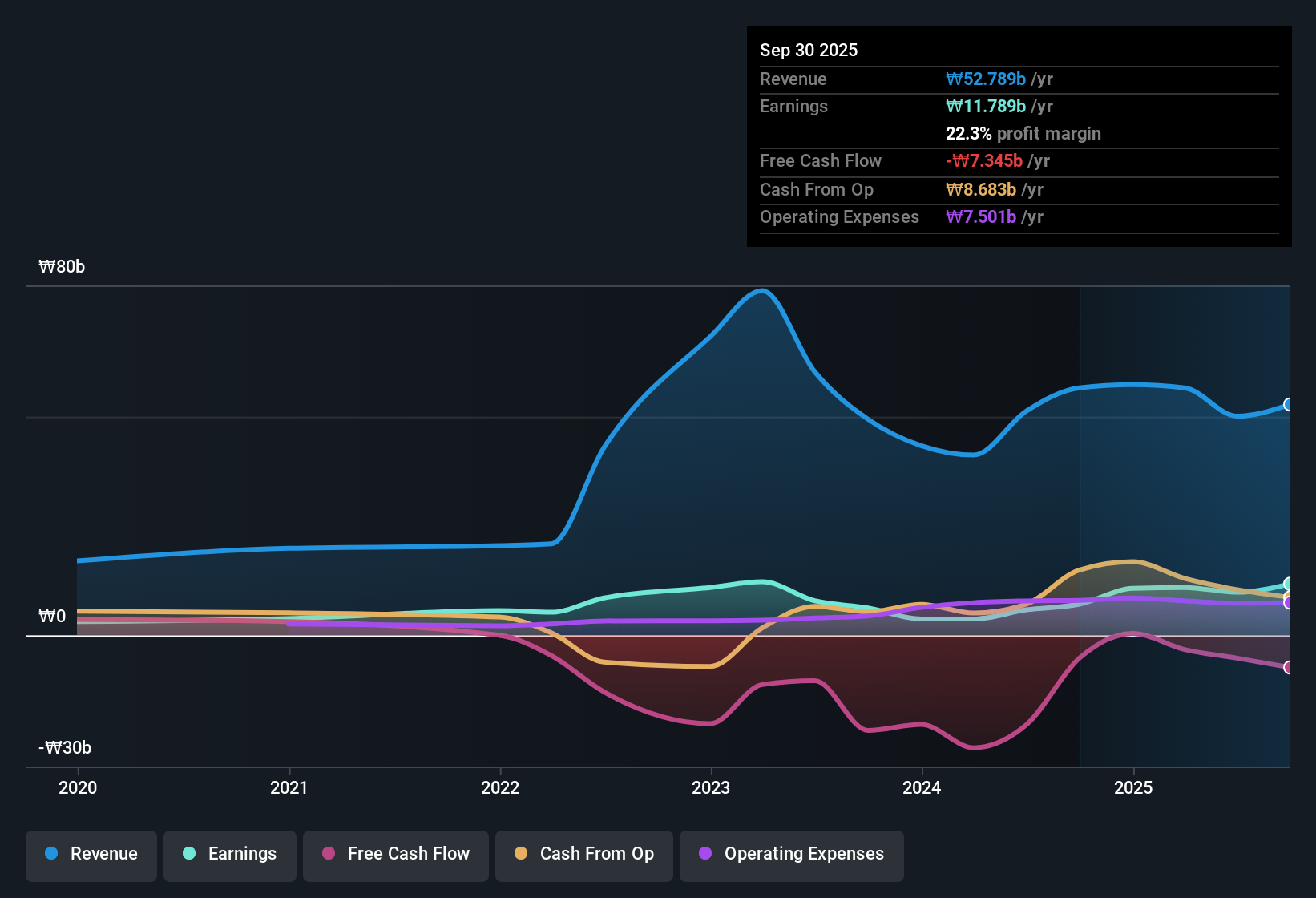- South Korea
- /
- Semiconductors
- /
- KOSDAQ:A417500
JI-Tech's (KOSDAQ:417500) Earnings Might Be Weaker Than You Think
JI-Tech Co., Ltd. (KOSDAQ:417500) posted some decent earnings, but shareholders didn't react strongly. We think that they might be concerned about some underlying details that our analysis found.

Zooming In On JI-Tech's Earnings
One key financial ratio used to measure how well a company converts its profit to free cash flow (FCF) is the accrual ratio. In plain english, this ratio subtracts FCF from net profit, and divides that number by the company's average operating assets over that period. This ratio tells us how much of a company's profit is not backed by free cashflow.
That means a negative accrual ratio is a good thing, because it shows that the company is bringing in more free cash flow than its profit would suggest. While having an accrual ratio above zero is of little concern, we do think it's worth noting when a company has a relatively high accrual ratio. To quote a 2014 paper by Lewellen and Resutek, "firms with higher accruals tend to be less profitable in the future".
For the year to September 2025, JI-Tech had an accrual ratio of 0.21. Unfortunately, that means its free cash flow fell significantly short of its reported profits. Even though it reported a profit of ₩11.8b, a look at free cash flow indicates it actually burnt through ₩7.3b in the last year. We also note that JI-Tech's free cash flow was actually negative last year as well, so we could understand if shareholders were bothered by its outflow of ₩7.3b. Having said that it seems that a recent tax benefit and some unusual items have impacted its profit (and this its accrual ratio).
See our latest analysis for JI-Tech
Note: we always recommend investors check balance sheet strength. Click here to be taken to our balance sheet analysis of JI-Tech.
How Do Unusual Items Influence Profit?
The fact that the company had unusual items boosting profit by ₩749m, in the last year, probably goes some way to explain why its accrual ratio was so weak. While it's always nice to have higher profit, a large contribution from unusual items sometimes dampens our enthusiasm. When we crunched the numbers on thousands of publicly listed companies, we found that a boost from unusual items in a given year is often not repeated the next year. And, after all, that's exactly what the accounting terminology implies. If JI-Tech doesn't see that contribution repeat, then all else being equal we'd expect its profit to drop over the current year.
An Unusual Tax Situation
Moving on from the accrual ratio, we note that JI-Tech profited from a tax benefit which contributed ₩3.9b to profit. This is meaningful because companies usually pay tax rather than receive tax benefits. The receipt of a tax benefit is obviously a good thing, on its own. However, our data indicates that tax benefits can temporarily boost statutory profit in the year it is booked, but subsequently profit may fall back. Assuming the tax benefit is not repeated every year, we could see its profitability drop noticeably, all else being equal.
Our Take On JI-Tech's Profit Performance
In conclusion, JI-Tech's weak accrual ratio suggests its statutory earnings have been inflated by the non-cash tax benefit and the boost it received from unusual items. For the reasons mentioned above, we think that a perfunctory glance at JI-Tech's statutory profits might make it look better than it really is on an underlying level. If you want to do dive deeper into JI-Tech, you'd also look into what risks it is currently facing. Our analysis shows 3 warning signs for JI-Tech (1 shouldn't be ignored!) and we strongly recommend you look at them before investing.
Our examination of JI-Tech has focussed on certain factors that can make its earnings look better than they are. And, on that basis, we are somewhat skeptical. But there is always more to discover if you are capable of focussing your mind on minutiae. For example, many people consider a high return on equity as an indication of favorable business economics, while others like to 'follow the money' and search out stocks that insiders are buying. So you may wish to see this free collection of companies boasting high return on equity, or this list of stocks with high insider ownership.
New: Manage All Your Stock Portfolios in One Place
We've created the ultimate portfolio companion for stock investors, and it's free.
• Connect an unlimited number of Portfolios and see your total in one currency
• Be alerted to new Warning Signs or Risks via email or mobile
• Track the Fair Value of your stocks
Have feedback on this article? Concerned about the content? Get in touch with us directly. Alternatively, email editorial-team (at) simplywallst.com.
This article by Simply Wall St is general in nature. We provide commentary based on historical data and analyst forecasts only using an unbiased methodology and our articles are not intended to be financial advice. It does not constitute a recommendation to buy or sell any stock, and does not take account of your objectives, or your financial situation. We aim to bring you long-term focused analysis driven by fundamental data. Note that our analysis may not factor in the latest price-sensitive company announcements or qualitative material. Simply Wall St has no position in any stocks mentioned.
About KOSDAQ:A417500
JI-Tech
Manufactures and sells precursor raw materials and products for semiconductors in South Korea and internationally.
Excellent balance sheet with proven track record.
Market Insights
Community Narratives



